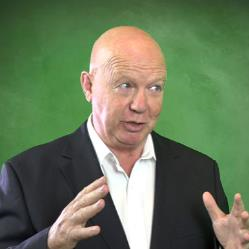 "To achieve high performance first focus on strategy before metrics" - Interview by John Smibert
"To achieve high performance first focus on strategy before metrics" - Interview by John Smibert
Most sales organisations focus very heavily on managing metrics. We set a metrics based plan. Then we monitor how are we doing this month and this quarter against the plan and then try to adjust our activity to pull it in line with the metrics based plan.

Yet how many of us engineer a strategic plan that will help develop and sustain our high performance culture? How many have a living strategic plan that drives the right behaviour and intent.
Maria Nordstrom suggests that by managing your sales performance based on metrics you will often work against you achieving a high performance culture. You need to ensure you are driven by strategy first.
I asked Maria to explain why metrics without strategy is counter productive and to tell me what we need to do about it
View or read the full interview to get to learn more. This is likely to be valuable reading for CEO's, CSO's and Sales leaders. This is the fifth in a series of 10 interviews with Maria where we explore sales leadership and high performance cultures.
************
Maria Nordstrom, Managing Director of The Upside Group, is an executive coach, a specialist in sales leadership and a change leader focused on high performance sales cultures.
Interview
John: Hello, I've got Maria Nordstrom with me again - welcome back, Maria!
Maria: Thank you, John!
John: Hey, loving these discussions about driving a high-performance culture. One of the things that I'm really interested in and I know you talked about a lot is the whole area of metrics and strategy, can one go without the other and so on and so forth. I'd like to explore that topic a little bit.
Maria: Okay. Well, I think you know metrics is very easy, it's the numbers that you have in the sales organisation, it's your target, that's the revenue, that's number of units, it's what you're measured on, and that's what the organisation is measured on, because obviously there are other metrics outside the sales area as well. My experience tells me, and having worked in organisations before I was with Xerox for many years, I worked for an American company and the American company was very much focused just on the metrics, there wasn't really a strategy per se.
 John: "Here's our product, here's our services, here's what you've got to sell - go do it!"
John: "Here's our product, here's our services, here's what you've got to sell - go do it!"
Maria: "Go do it," exactly. We had a local strategy, that was kind of a strategy, but the overall organisation only worked for the metrics plan, and I still think today that is not unusual. You create your vision, you have your values and you put all of that up on the wall at the kick-off at the beginning of the year, but the plan that you manage every week or every month is basically the metrics plan, and there are certain times when you do your big town hall meetings or you have a review meeting, and at that point you may just bring up those.
John: "Here's how we're doing, and we're not doing so well in this area or that area. What are you doing about it?"
Maria: But that's the metrics plan, but at that point you may actually bring up the overall messaging that you had in the beginning of the year. Some organisations don't necessarily do a lot with that. My experience tells me that basically organisations generally focus on delivering reports around the metrics, and I think if you actually just do that, to create a high-performing culture is very difficult, because all you're saying to the people is the numbers is the only thing that's important. And of course they're important because that's what drives your organisation and outcomes...
John: Without it we don't survive.
Maria: Absolutely. But if we don't create a culture where you feel valued and a value contributor to that outcome and you're creating that culture...
John: We're not going to get the outcome anyway.
Maria: Absolutely. And to drive that culture you really need to feel that you make a difference, and to make a difference you need to feel that you're connected to a strategy that is more than just the metrics that goes for a month, six month or a year. So you need to have a much longer-term strategic intent, and in that strategic intent you work with the people within it to actually show them that they are valuable contributors, to actually be able to achieve that outcome at the end of the day.
John: But you talk to most organisations and they tell me they've got a strategy. Are you saying they haven't?
Maria: I would say that this strategy when it comes down to it is generally numbers.
John: Very, very numbers focused.
Maria: Absolutely.
John: Okay, alright. So what do people really need to think about this? If they're thinking "I've got a strategy," but you're saying they haven't, what are the questions they need to ask themselves to really test whether they've got a strategy?
Maria: They need to really have a good understanding of the market and the customers, they need to understand the organisation, how the organisation is going to deliver what they're going to deliver, and what are the key things within the organisation that they need to undertake and do to be able to deliver that effectively. I think a culture can be driven by fear or it can be driven by "Having to do something because I'm told to do it, or I truly understand what I really need to do..."
John: And I feel empowered to do it.
Maria: And I feel empowered to do it, exactly. That's a big difference in doing that, and I still see today there are some organisations that do that really well, but I would say that only one in five strategies get implemented effectively. So you have a strategy on paper but it's not necessarily embedded in the organisation, and I think that's one of the key things.
 John: Okay, I understand where you're coming from there. So for empowerment of the people, to drive a high-performing culture, they need to be empowered, and they can't be empowered unless they really have a very clear strategy that they understand, the strategy of the organisation, and they can feel part of that and feel that they have a sense of contribution to that strategy.
John: Okay, I understand where you're coming from there. So for empowerment of the people, to drive a high-performing culture, they need to be empowered, and they can't be empowered unless they really have a very clear strategy that they understand, the strategy of the organisation, and they can feel part of that and feel that they have a sense of contribution to that strategy.
Maria: Yes. I mean, I've managed matrix organisations for instance in the past, and as a matrix you have functional managers that sits anywhere and everywhere and you are managing a group of people; some directly report to you, some ~have a dotted~ line to you. In a context of what you want to achieve, you need to take the core metrics out of the equation; they still need to be measured, but you need to find some common ground that you can work towards as a collective group, and in doing that you actually still achieve those metric outcomes, but for instance you may just focus on the customer. I had a leadership team of 18 people - which is a big leadership team, too big really, but it was 18 people - and some of the objectives and some of the targets were actually in conflict with each other, so there was always a lot of that, and I think when you have a lot of that it actually causes people on a personal level to feel disconnected or get frustrated or feel a bit annoyed.
John: Yes.
Maria: So we sat down as a group and we said, "We really need to do this," it doesn't mean that that goes away, but if we do all our problem solving and all our discussion in the context of the customer and what's best for the customer at the end of the day, what will our problem solving process look like? We started on that journey, and surprisingly the people that were the ones that actually fought it the most to actually go down that path were the ones that became the big advocates, because they've realised... Because they felt that they were the ones that always got the brunt of whatever budgetary things that we needed to put against on their balance sheet, or something that needed to be paid generally. So basically what happened was that once we had that problem solving and it was for the customer we also worked with shared pain, and the shared pain then meant that we actually shared the pain across the organisation and we looked at it realistically. We didn't look at fault, we looked at what made sense.

John: I equate this to a football team. Yes, you have all your champions in a football team, but if they all play as individual champions and don't understand the overall goals and objectives of the team and where they're going, they'll do selfish things or they won't do what they need to do to ultimately achieve the end result. So it's how they all work together and what the strategy to do that is so that "I'll pass this off this time rather than going for goal because that's more important for the team."
Maria: Absolutely. If you relate it to a sports team, it actually makes sense. I've been in sports for a long time, and I think if you have that team view, that if the group is stronger than the individual, depending on how they collaborate and how they work together, then you will actually be quite successful. But you need to have the mindset of that to be able to do it well.
John: And also the right people.
Maria: Yes.
John: The lone wolves in that sort of environment could cause more damage than good; it may be that the guys achieve 200% of quota, but they're likely to damage the team results.
Maria: Yes, I agree. I've had in my career some lone wolves, and it's an interesting conundrum to work with, because you can either let them continue working on their own, or you need to find a balance where they actually come into the fold a little bit to manage that as well, so you act for the greater good of the group.
John: Yes, and you see that in my analogy of football a lot, where'll you would get this massive champion that's a lone wolf on the football side, and eventually you have to get rid of that person because they're actually causing the team to lose.
Maria: I've had to do that too. [laughs]
John: Okay. That's good discussion, I think there'll be a lot of value out there - I appreciate it very much and I look forward to the next one!
Maria: Thank you, John!
****************
Access Maria Nordstrom at The Upside Group
View a previous discussion with Maria here:
****************

Your Invitation: I invite you to join the Sales Leader Forum group on LinkedIn where you can experience informative discussions with your peers and sales thought leaders on subjects like the one we have discussed here. I also invite you to subscribe to the
- Sales Leader Resource Centre here
- Sales Leader YouTube channel here (300+ sales leadership videos)
Please Share: If you valued this article, please share via your Twitter, LinkedIn, Google+ and Facebook social media platforms. I encourage you to join the conversation or ask questions. So feel free to add a comment on this post - I promise to respond. If inclined please follow my LinkedIn post page here.
Want to touch base? If you have questions please feel free to contact me - email: john.smibert(at)salesleaderforums.com, Phone: +61 404857893 or Skype: john.smibert